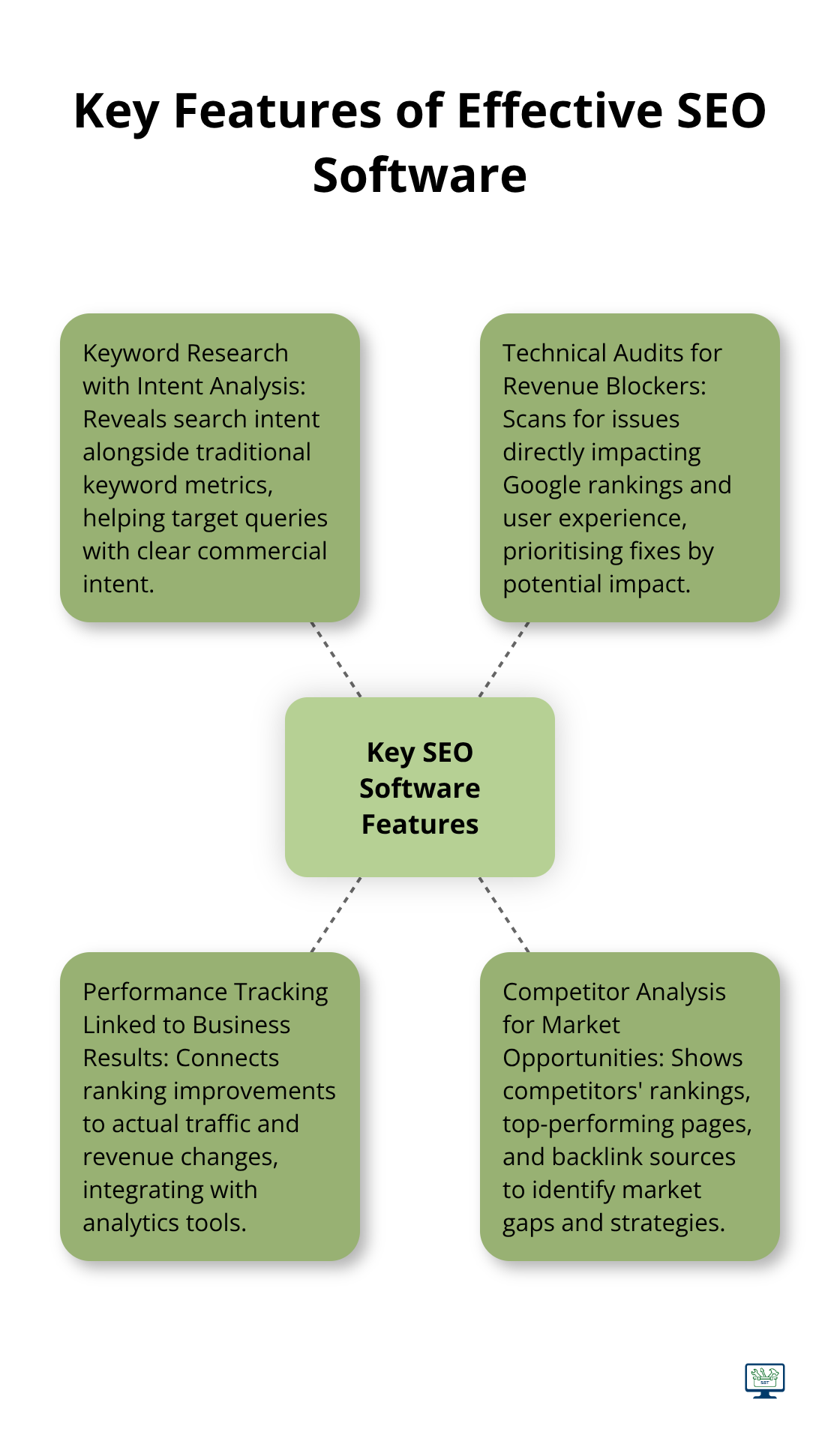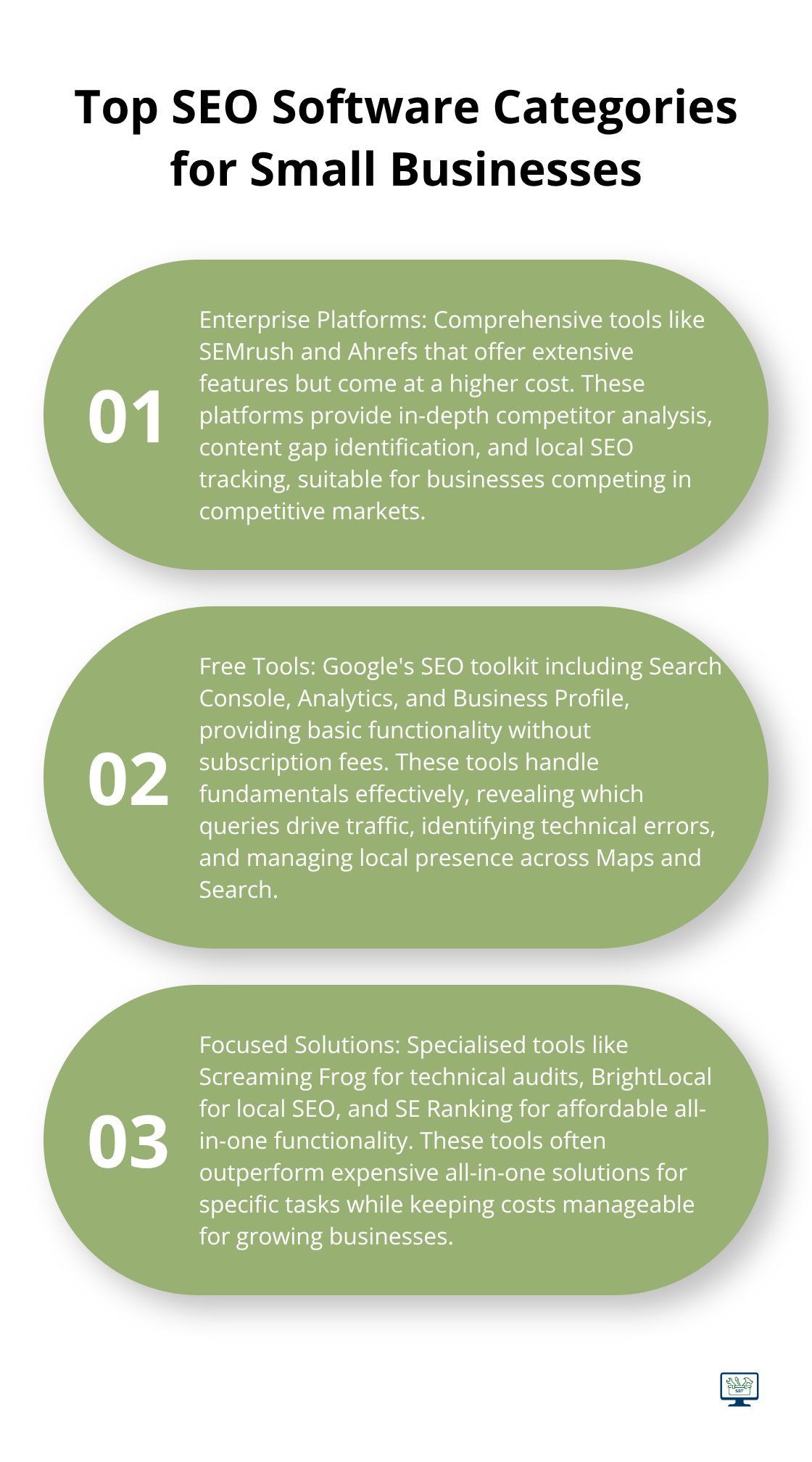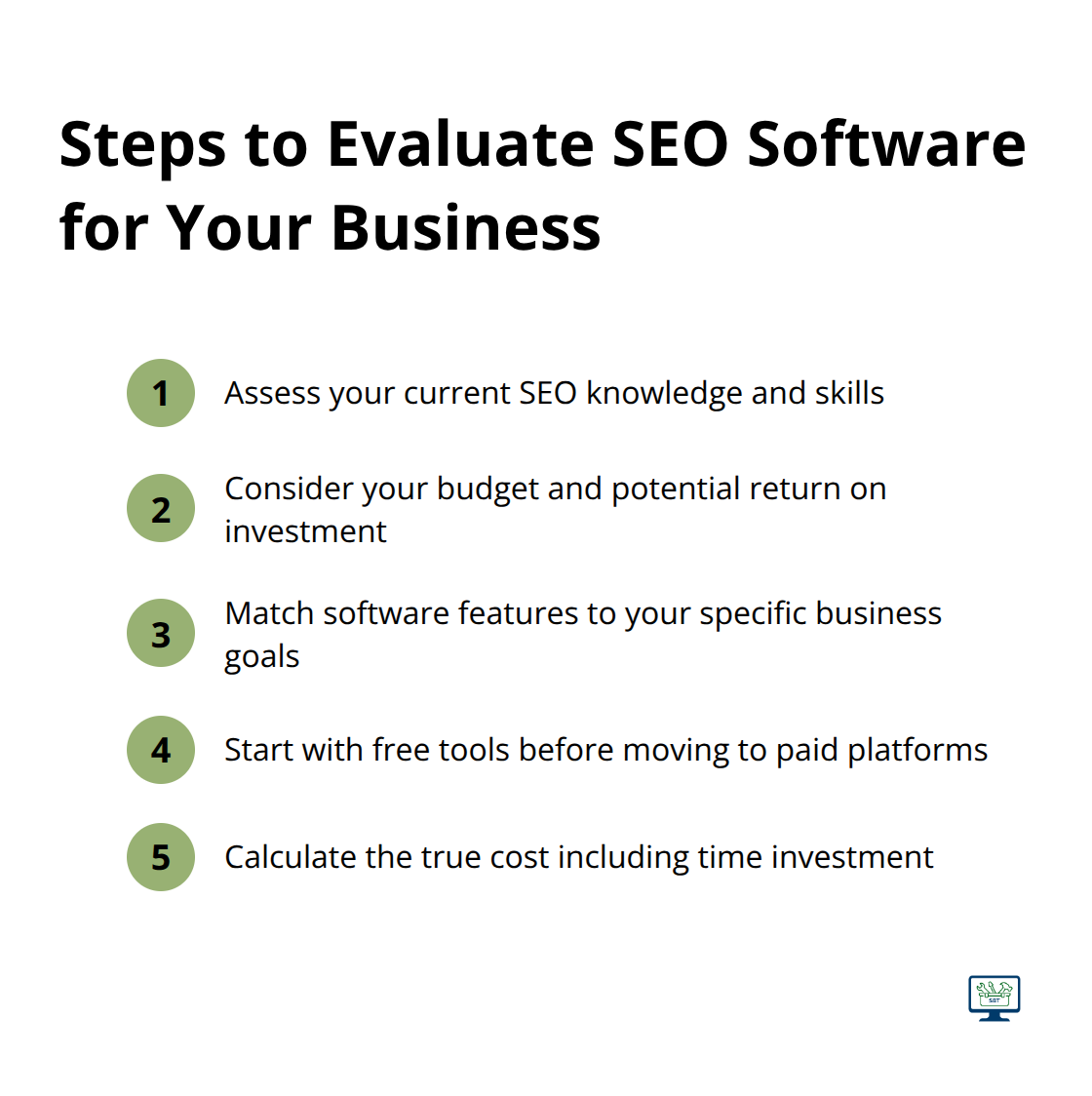How to Choose the Best SEO Optimization Software

Published On Sep 21,2025
Small business owners face a challenging decision when selecting the best SEO optimisation software for their operations. With over 200 ranking factors influencing Google’s algorithm, the right tools can make the difference between online visibility and obscurity.
At WebsiteStrategies, we’ve analysed dozens of SEO platforms to help Australian businesses navigate this complex landscape. The software you choose will directly impact your search rankings, organic traffic, and ultimately your bottom line.
Key Features to Look for in SEO Software
Modern SEO software platforms offer hundreds of features, but only four capabilities truly determine whether your investment will drive meaningful results for your Australian business. After we tested over 50 SEO tools with small business clients, we identified the features that separate effective platforms from expensive disappointments.

Keyword Research That Reveals Search Intent
The most valuable SEO software provides search intent analysis alongside traditional keyword metrics. Tools like SEMrush and Ahrefs now show you whether searchers want information, products, or local services when they type specific queries. This intelligence matters more than raw search volume because you can target 500 monthly searches with clear commercial intent rather than chase 5,000 monthly searches from people who browse for general information.
Search for platforms that reveal keyword difficulty scores based on actual competitor analysis rather than generic estimates. The best tools also identify long-tail variations that Australian businesses can realistically rank for within 3-6 months. These specific keyword opportunities often convert better than broad terms with higher competition.
Technical Audits That Identify Revenue Blockers
Your SEO software must scan for the technical issues that directly impact Google rankings and user experience. Page speed analysis, mobile responsiveness checks, and broken link detection form baseline requirements. More advanced platforms like Screaming Frog identify duplicate content issues, missing meta descriptions, and improper heading structures that cost you rankings.
The most effective tools prioritise fixes by potential impact rather than overwhelm you with hundreds of minor issues. Schema markup validation and Core Web Vitals monitoring have become essential features since Google’s page experience update affected ranking algorithms in 2021 (making site speed and user experience direct ranking factors).
Performance Tracking That Connects to Business Results
Rank tracking alone provides limited value unless your software connects ranking improvements to actual traffic and revenue changes. Modern SEO platforms integrate with Google Analytics to show which keyword rankings drive the most qualified visitors to your site. Search for tools that track local rankings across different Australian cities if you serve regional markets.
The best platforms also monitor your Google Business Profile performance and local citation consistency. Weekly ranking reports matter less than monthly traffic trend analysis that shows whether your SEO efforts translate into business growth. This data helps you focus on keywords that actually generate leads rather than vanity metrics.
Competitor Analysis That Reveals Market Opportunities
Effective SEO software shows you exactly which keywords your competitors rank for and which content gaps exist in your market. Advanced platforms like Ahrefs reveal your competitors’ top-performing pages, their backlink sources, and their content strategies (giving you a roadmap for improvement). This intelligence helps you identify opportunities your competitors miss.
The most valuable competitor analysis tools also track your market share for important keyword groups and alert you when competitors launch new content or gain significant rankings. These insights help you stay ahead of market changes and identify which competitor strategies actually work in your industry.
Top SEO Software Options for Small Businesses
Enterprise Platforms That Justify Their Cost
SEMrush dominates the comprehensive SEO platform market and offers 55 products that cover every aspect of digital marketing. Their keyword research database monitors over 800 million unique domains, which makes it the most extensive data source available to Australian businesses. The platform costs $119 monthly but delivers enterprise-level competitor analysis, content gap identification, and local SEO tracking that would require multiple separate tools.
Ahrefs offers similar depth with their backlink database of 295 billion pages. Their $99 starting price reflects a focus on link building and competitor research rather than broader marketing automation. Both platforms provide the comprehensive data that serious businesses need to compete in competitive markets.

Free Tools That Punch Above Their Weight
Google’s free SEO toolkit provides comprehensive analytics and insights without monthly subscriptions. Google Search Console reveals which queries drive traffic to your site, identifies technical errors, and shows your average ranking positions across thousands of keywords. Google Analytics connects this ranking data to actual revenue, while Google Business Profile manages your local presence across Maps and Search.
These tools handle the fundamentals effectively, though they lack the competitor intelligence and advanced keyword research that paid platforms provide. Google Keyword Planner adds search volume data for content planning, making this combination suitable for businesses with basic SEO needs.
Focused Solutions for Specific Problems
Screaming Frog excels at technical SEO audits with their website crawler that identifies broken links, duplicate content, and missing meta descriptions across unlimited pages for just £149 annually. BrightLocal specialises in local SEO management for Australian businesses, tracking citations across directories and monitoring Google Business Profile performance for $29 monthly.
SE Ranking combines affordability with functionality at $44 monthly. It offers rank tracking, keyword research, and competitor analysis without the complexity of enterprise platforms. These specialist tools often outperform expensive all-in-one solutions for specific tasks while keeping costs manageable for growing businesses.
The key lies in matching your software choice to your actual business requirements rather than choosing based on features you might never use. For comprehensive guidance on implementing these tools effectively, explore our SEO resources to boost your online presence.
Evaluating SEO Software for Your Business Needs
Assess Your Current SEO Knowledge and Skills
Your SEO software decision starts with an honest assessment of your technical capabilities and available time commitment. Most Australian small business owners overestimate their SEO knowledge and underestimate the learning curve that advanced platforms like SEMrush or Ahrefs require. If you struggle with Google Analytics basics or cannot identify duplicate content issues on your website, you create more confusion than results when you invest in enterprise-level tools.
Start with Google Search Console and Google Analytics to master fundamental concepts before you move to paid platforms. Businesses that jump directly to complex tools waste time as they learn features they never needed while they miss obvious optimisation opportunities.
Consider Your Budget and Return on Investment
Budget allocation requires you to calculate the true cost of SEO software beyond monthly subscription fees. A $119 SEMrush subscription becomes $200+ monthly when you factor in the 5-10 hours weekly that you need to extract meaningful insights and implement recommendations. Small businesses that generate less than $50,000 monthly revenue should focus on free tools plus one specialist solution rather than comprehensive platforms.
The subscription cost represents only half of your total investment. You must account for the time you spend learning the platform, analysing data, and implementing recommendations (which often exceeds the software cost itself).

Match Software Features to Your Business Goals
The most successful approach involves you matching specific business goals to software capabilities rather than choosing based on feature count. Local service businesses need citation management and Google Business Profile tracking more than international keyword research. E-commerce sites require product page optimisation tools and competitor pricing analysis rather than local SEO features.
This targeted approach delivers measurable results within 90 days instead of overwhelming business owners with irrelevant data that never translates into improved rankings or increased traffic. You should prioritise tools that address your immediate SEO challenges rather than platforms that promise to solve every possible problem.
Final Thoughts
The best SEO optimisation software matches your business needs to platform capabilities rather than offers comprehensive toolsets that overwhelm your resources. Australian small businesses succeed when they focus on keyword research accuracy, technical audit depth, and competitor intelligence over feature-rich solutions they never fully use. Local service providers benefit most from Google’s free toolkit combined with BrightLocal for citation management, while e-commerce businesses need SEMrush or Ahrefs for competitive product research.
Your software choice matters less than consistent implementation and data-driven decision making. Businesses that track rankings without connecting improvements to revenue growth waste valuable resources on vanity metrics rather than meaningful business outcomes. The most effective approach involves mastering one platform thoroughly rather than switching between multiple tools that create confusion and inconsistent results.
We at WebsiteStrategies help Australian businesses implement these tools effectively through tailored SEO consultancy that translates complex technical findings into actionable strategies. The right software combined with expert guidance transforms your website into a reliable lead-generating asset that drives sustainable growth. Success comes from choosing tools that align with your current capabilities and business goals (not from chasing the most expensive or feature-heavy platforms available).
